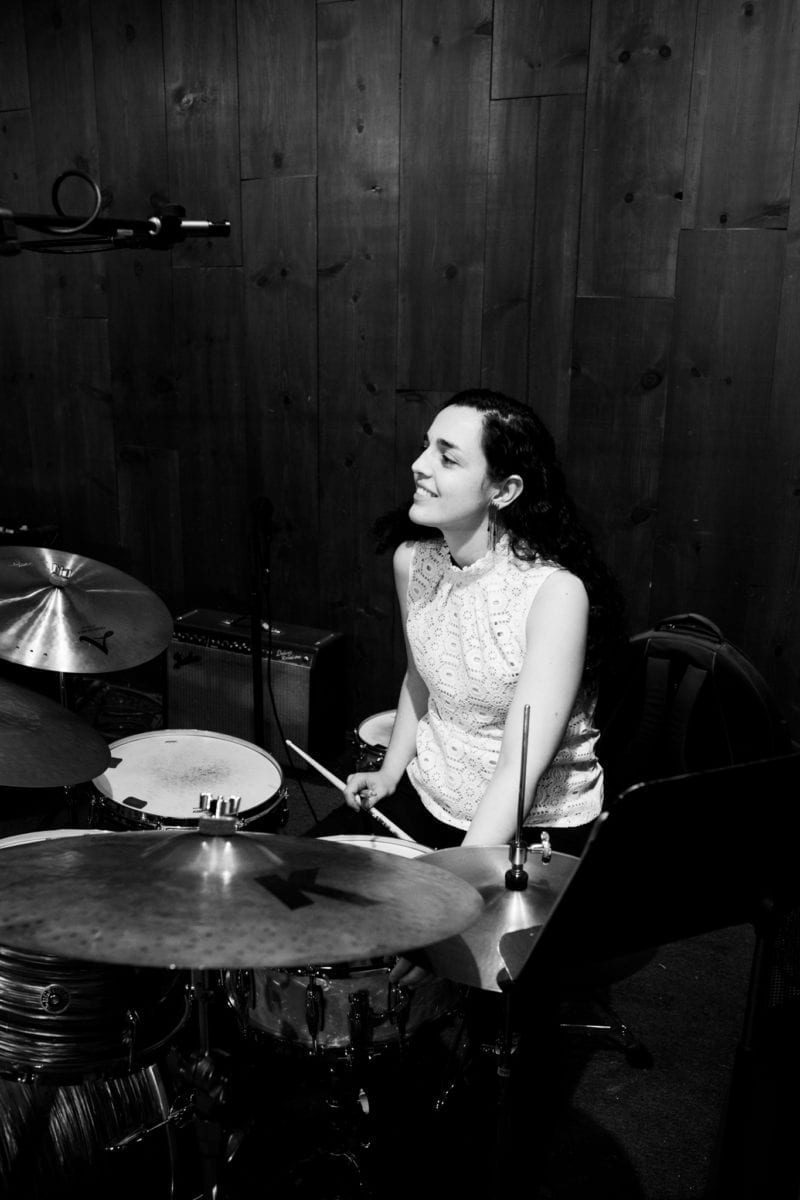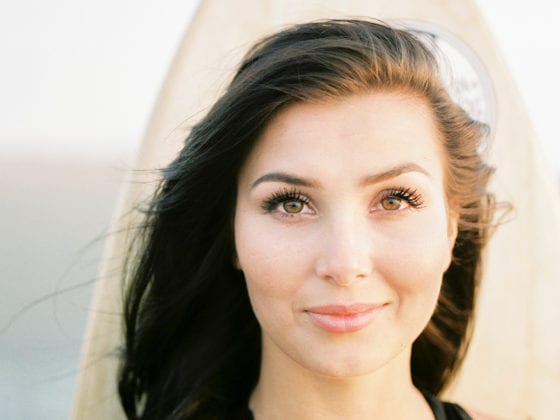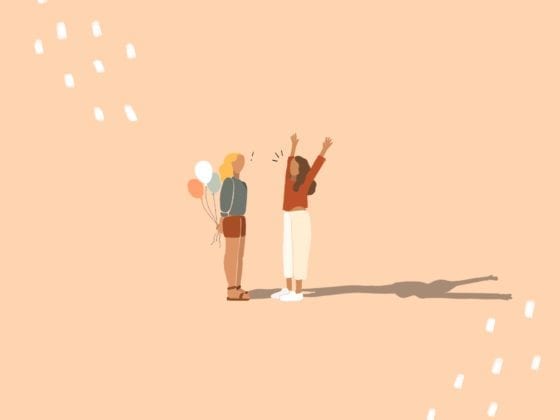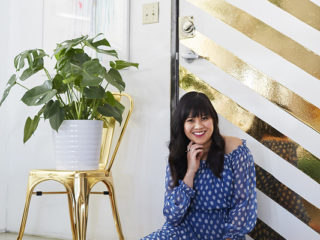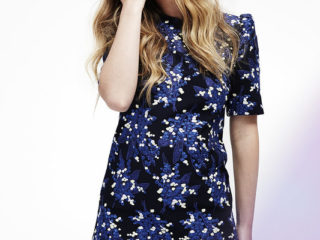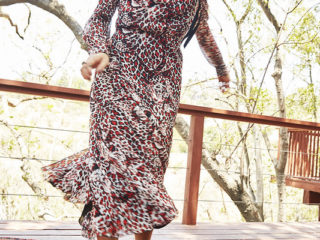“Real Women, Real Work” is a Darling series about everyday women who work in various fields including business, entertainment, science and education. We want to get to know the WHY behind their WHAT and get an inside look into different industries.
Growing up in the southeast region of Brazil in a small town called Poços de Caldas, Ana Barreiro had dreams of being a doctor. More specifically, she wanted to be a hematologist like her dad, a bone marrow transplant doctor who specializes in diseases related to the blood. Her parents were doctors, as well as many of her other relatives. In time, her medical dreams would take a back seat to music as she pursued a career as a professional drummer.
Barreiro’s curiosity for playing the drums was first sparked at age 11 while on a trip with a friend’s family. They were all kind of tapping on things and playing around, and her friend’s family told her she was really good at it. So Barreiro went back to her mom and told her that she wanted to start taking drum lessons.
During her lessons, Barreiro’s knowledge of music quickly impressed her teacher. Her ability to read music and pick up on new techniques quickly garnered Barreiro support at a young age. She recalls her teacher’s constant encouragement and praise.
“I would tell my teacher that I was going to be a doctor someday, and he just couldn’t believe I wasn’t going to be a drummer,” Barreiro recalled. “He was the one who really believed in me since I started.”
Barreiro has called Los Angeles home for the last seven years, where she works as a professional drummer in the jazz music scene. She is the cofounder of a jazz band, AmyAna, which she started with her friend, pianist Amy K. Bormet. The five-piece jazz band consists of Barreiro (drums), Bormet (piano), Aaron Janik (trumpet), David Wise (sax) and Sezin Ahmet Turkmenoglu (bass).
Barreiro and Bormet first connected over their love of jazz music, and when they met, there was an instant kinship. AmyAna is a mirror of their friendship with songs like Bormet’s “Santa Ana Slip,” a swinging bluesy number, and upbeat Brazilian melodies, like Barreiro’s “Saudade.” The two bonded over time as they traveled to concerts and gigs, carpooled to jam sessions and sat in living room listening sessions.
From the little drummer who could (according to her first music teacher), today Barreiro is a successful jazz drummer in the City of Angels. Darling sat down with Barreiro to learn about her career journey in music, what it’s like to be a woman drummer and her advice for other young women with music aspirations.
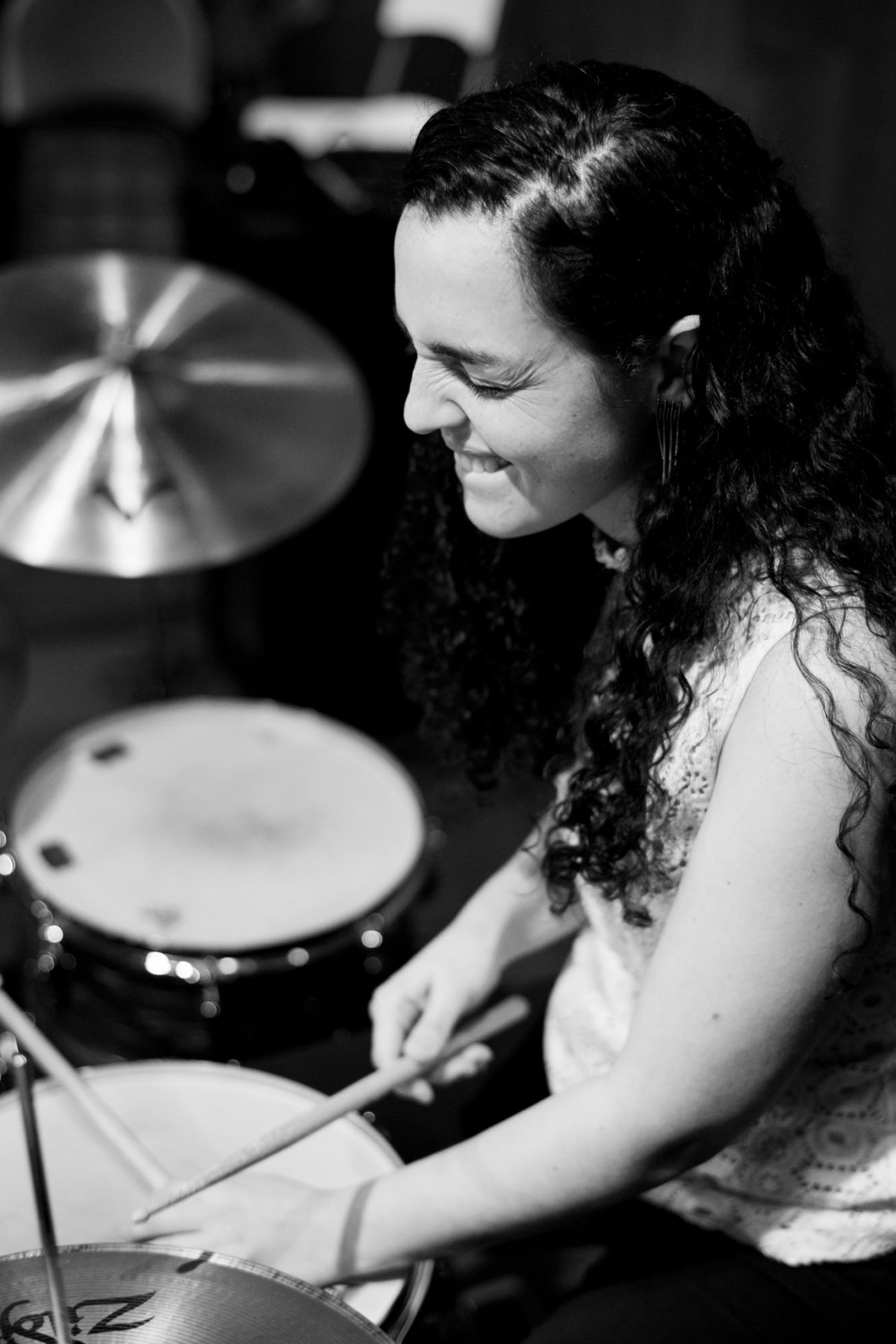
As a kid, what did you want to be when you grew up?
I wanted to be a doctor. Both my parents are doctors, and growing up, my dad had a whole plan for me. We planned where I was going to go to school and what kind of medicine I was going to specialize in. I always liked music a lot, but I never thought that I was going to be a musician. I was going to be a doctor, and music was just fun and something I enjoyed.
I was applying to a bunch of medical schools when I actually made the decision to change my career path and become a musician instead. In Brazil, it’s different from the United States because when you apply for college, you do an entrance exam for every school you apply to. I remember doing like eight of them.
On the way back from my last exam, I remember thinking, “What am I doing? What are the things I’d really like to do?” One of them was to play drums. The other one was to play handball, a sport in Brazil. I wasn’t very good at handball, but I thought drumming was something I could practice and be good at one day. Then, just like in a second, I changed my mind, and I didn’t want to go to medical school anymore. Something I had planned my whole life, I changed on a car ride home, and I was like, “I’m going to be a drummer!”
Something I had planned my whole life, I changed on a car ride home, and I was like, “I’m going to be a drummer!”
What was your parents’ reaction to you changing your career plans?
My parents’ reaction was really good. I never felt like I wasn’t supported. I wonder now if they struggled inside because we had this whole plan, but they just didn’t show it.
Medicine was a family business. I have a couple of uncles who are doctors and a bunch of my cousins are doctors too. My friends were the sons and daughters of doctors. Medicine was very present in my life. Everyone was going to be a doctor so that was my plan too.
Even though my parents didn’t know how the music industry worked, they were very supportive because I was really into music. I just had never said I was going to pursue it. I feel like they saw it already and so it wasn’t hard to believe I could do it.
I started taking piano lessons at age 6, and then, I began playing in front of people at my church when I was 12. Shortly after that, I started playing drums. From then on, I just played drums.
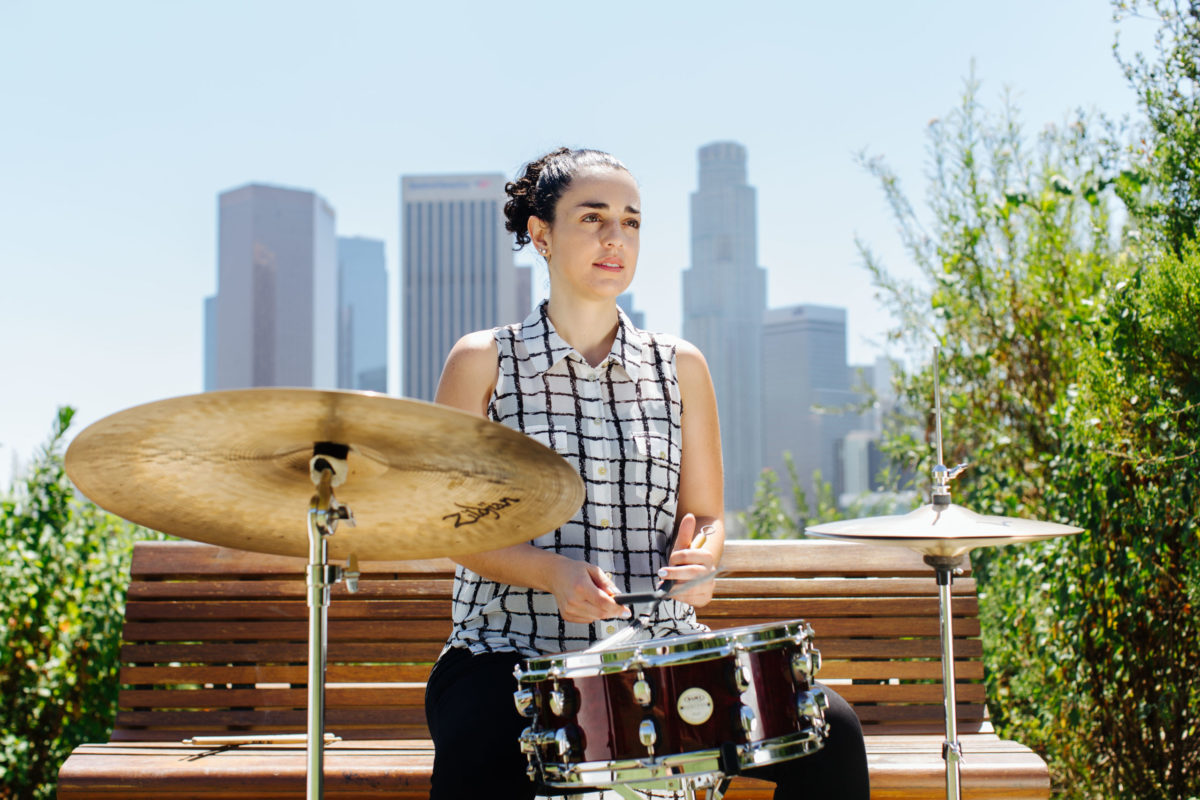
What prompted you to move to Los Angeles from Brazil?
I actually moved to Boston first from Brazil. I transferred from a music college in Brazil to study at Berklee College of Music in Boston. Once I was done, my brother was already living in Los Angeles, and I decided I was going to do a master’s before returning to Brazil. I realized that the University of Southern California had a great master’s program, and there’s a great drummer who teaches there named Peter Erskine. I was a huge fan, and when I saw he taught there, I decided to apply. I moved here to do my master’s degree at USC in jazz studies in 2013.
I lived in L.A. for three months right after I left Boston. Then, because of my VISA situation and waiting to be accepted into USC, I took a job playing drums on a cruise ship for seven months. I did two cruise ships. One was four months in the Caribbean and the other one was three months in the Mediterranean. It was a blast, and I learned a lot as a drummer. There are all kinds of people, people who are more seasoned musicians and people like me who were fresh out of school. It was a great place to go and get experience. Then, once I was approved by USC, I finished playing cruise ships and started school.
What was your time like at USC?
My master’s program at USC was focused on jazz. That’s where I got a lot better at playing jazz. I think coming to a city like L.A., to have a school with a bunch of professionals in it like USC, it opens a lot of doors. I met a lot of people who were already working. Whenever I was done at USC, my first really good gig was with one of the teachers at USC, pianist Otmaro Ruiz.
One thing I noticed about being a student in the music school is that everybody is watching. So even though it’s not a professional situation, people are watching. They want you to succeed. They will hire you if you are a good player. USC was preparing me for a career in music in L.A., not just with my skills and my knowledge, but it was preparing me to be on the music scene. My teachers were incredible. They were really interested in you, and they really wanted to know and mentor you. That’s what I liked the most.
After graduating, what was it like finding gigs?
It’s not about finding gigs—that’s one thing I have realized in time. The gigs find you. In a city like L.A., you don’t really find gigs. You just have to keep going and keep making music. People will notice and ask you to play and join them.
It’s not about finding gigs—that’s one thing I have realized in time. The gigs find you.
Once I was done with school, I was already teaching part-time at the Harmony Project, which is a music program for kids. I was doing that every week for a couple of hours. I was also teaching at another school called Media City School of Music in Glendale for a couple of hours, and I was playing a couple of gigs.
I had a lot of work after graduating. I just wanted to play and so everyone who would invite me to a jam, I would take it. I didn’t think it was hard to find work at the time. I just thought you have to be open and ready.
When it comes to finding music gigs, I’ve always had this assurance that God is in control. I never had trouble trusting that things would work out. I never felt that at any point like it wouldn’t work.
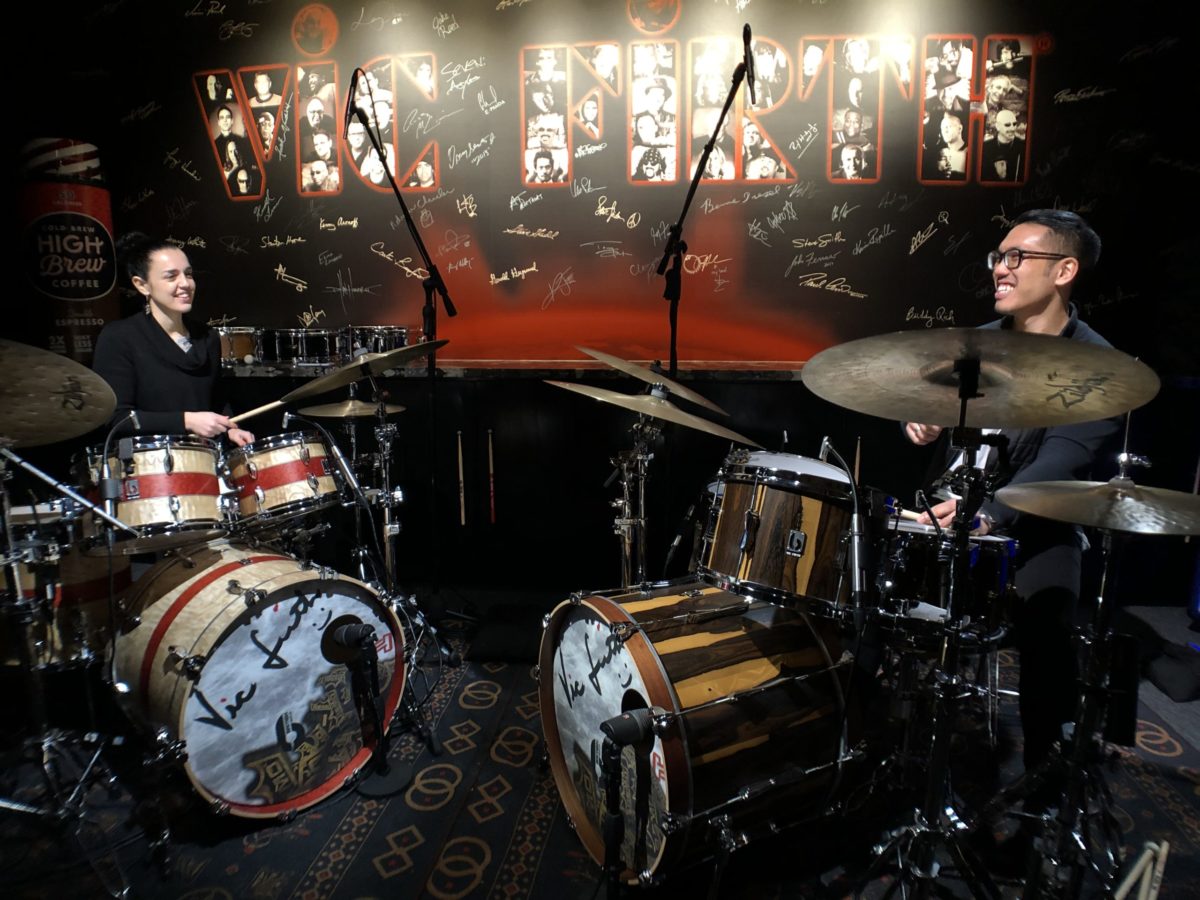
Are there many women who are professional drummers? What is the reaction to you being a woman drummer?
I think it has changed a lot. Right now, there are a lot of women playing every instrument. There are not as many women drummers as men of course, but there are a lot. When I was younger, the reaction was a lot different. People were surprised, but now, in a city like L.A., I feel like I’m just one more girl dummer. There are so many women now playing well!
The women empowerment movement in the last few years really brought women to the forefront of music. Artists wanted all female bands, which opened up more opportunities for women. I do think it’s still somewhat of a surprise, but less and less with younger generations.
Today, if girls do their research, then they will find women musician role models. I remember a time when you couldn’t find a lot. When I was young there weren’t many women drummers to look up to. The few I knew of inspired me to keep going. Girls today can find so many women drumming if they go online. That definitely changed a lot over the past few years, especially with the internet and social media. There’s so many girls kicking butt!
Today, if girls do their research, then they will find women musician role models. I remember a time when you couldn’t find a lot.
When you were younger, what encouraged you to play the drums, especially if there weren’t a lot of women doing it?
There weren’t a lot of prominent women drumming when I was younger, but there were a couple. One drummer was Lilian Carmona. When I went to my first drum lesson at 12 years old, I remember walking into the room, and on my teacher’s wall, I saw a picture of a lady and an interview with her. I asked who she was, and he told me that her name was Lilian Carmona and how she was this great drummer who plays jazz.
I never forgot that. It made me think I could be like her someday. Fast forward to age 19, and I took lessons with her. I would go to her house every two weeks, and now, we are actually good friends. She inspired me so much, and now, I’m just trying to be that for other people as well. I see how important it is for women to have representation when they are young so that they can see what they are capable of becoming.
I see how important it is for women to have representation when they are young so that they can see what they are capable of becoming.
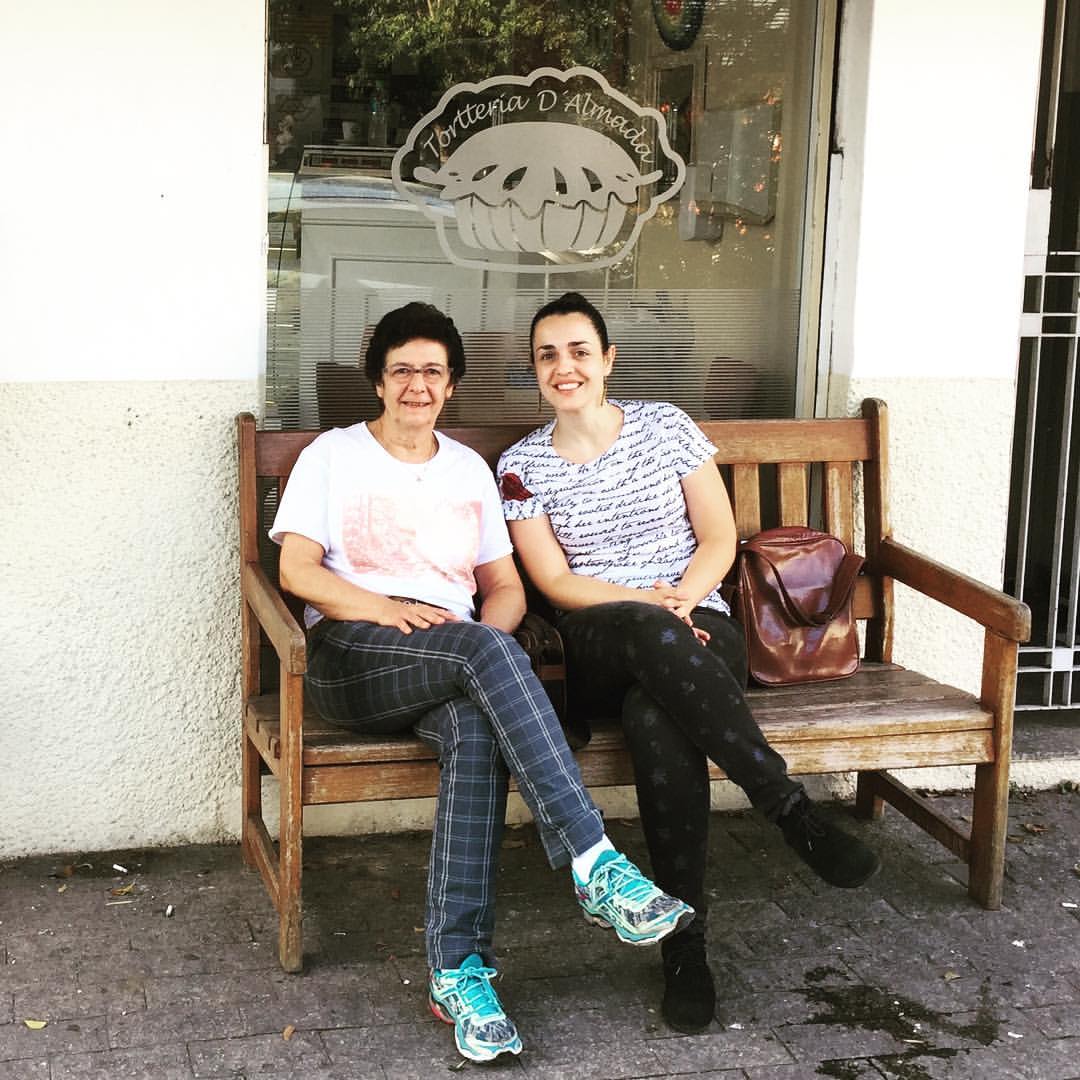
Before the pandemic, what did work look like as a professional drummer?
Before the pandemic, work was good. I teach at The Musicians Institute (MI) in Hollywood. Before the pandemic, I had 18 hours of work per week with 15 students. They are talented college students who want to become professional drummers. It is a challenging job, but it’s also a great job. I was also teaching for the summer at the Stanford Jazz Workshop, which is a summer camp at Stanford.
I was also going to teach at Jazz Camp West, and I had plans to tour with my band, AmyAna. I started the band with my friend Amy K. Bormet. We were going to have an east coast tour. We got into this competition, and we were finalists. We were going to have a show in New York and take the whole band from L.A. For a jazz group, it is not very normal to be able to afford to travel with your entire band.
How has the pandemic and quarantine affected your career?
I was really busy before the pandemic, and then, I was not. I had to figure out what else I could do if not playing gigs with people and going places to play music. Whenever the pandemic happened, it was at the end of the quarter at MI, so we had a break right when the pandemic started. Then, the next quarter, we went online. We started teaching everything on Zoom. I went down to just three hours a week. The tour got canceled. The camps got canceled. Everything got canceled.
I had to figure out what else I could do if not playing gigs with people and going places to play music.
It was a drastic transition for us. If you are a musician, then everybody lost their jobs, but the good thing for me is that I do have a studio in the back of the house. I can rehearse and record. I’ve also been using that to teach. Since quarantine started, I did get a couple of recording gigs, which was my first time doing that. I had to get used to recording and sending those to artists. It stretches you a little bit.
What has it been like teaching drumming lessons digitally?
The good part is that I can teach people who are really far away. Now that I have the means to teach online, I have taught people in Brazil. I have a student in England. I have another student in San Diego. It really opens the door for people because you don’t have to be in L.A. to have a drum lesson with me. With all the possibilities online, it’s nice when someone looks for you because it means you offer something specific that they want to learn.
I teach whatever my students want to learn as far as drumming goes. People do look for me more for jazz and Brazilian music. I do have one beginner student right now who I teach a lot of basic skills. I also have one girl drummer from England who is more on the rock side of things. She’s 10 years old, and she’s really good.
The bad part about teaching online is not being able to play together because you can’t play an exercise at the same time. I can show a student something, and then, they can repeat after me. The technology aspect means you can’t do things you would normally do together, but everything else kind of works.
How do you stay inspired to create music?
For me, it’s other people. Two things specifically—seeing people playing and hearing people’s stories.
Seeing other people play makes me want to practice and makes me excited to create. I don’t know if your hands itch when you read a good story, but if I am seeing someone play, literally, my hands itch. Then, I’m like, “Alright, time to sit on the drums!”
In the pandemic, even watching an interview gets me inspired. I have been watching a lot of interviews lately of how people do things. It inspires me to get ideas of what I can do musically.
I was listening to a fellow Brazilian drummer on a live stream who said he doesn’t listen to inspiration because inspiration can come and go. He trusts his mission. His mission keeps him going, not whether he is feeling inspired or not. That spoke to me because I thought, “Alright, if I have a mission, even when I’m not inspired, I just need to keep going.” It’s cool to see other people who are on the same journey.
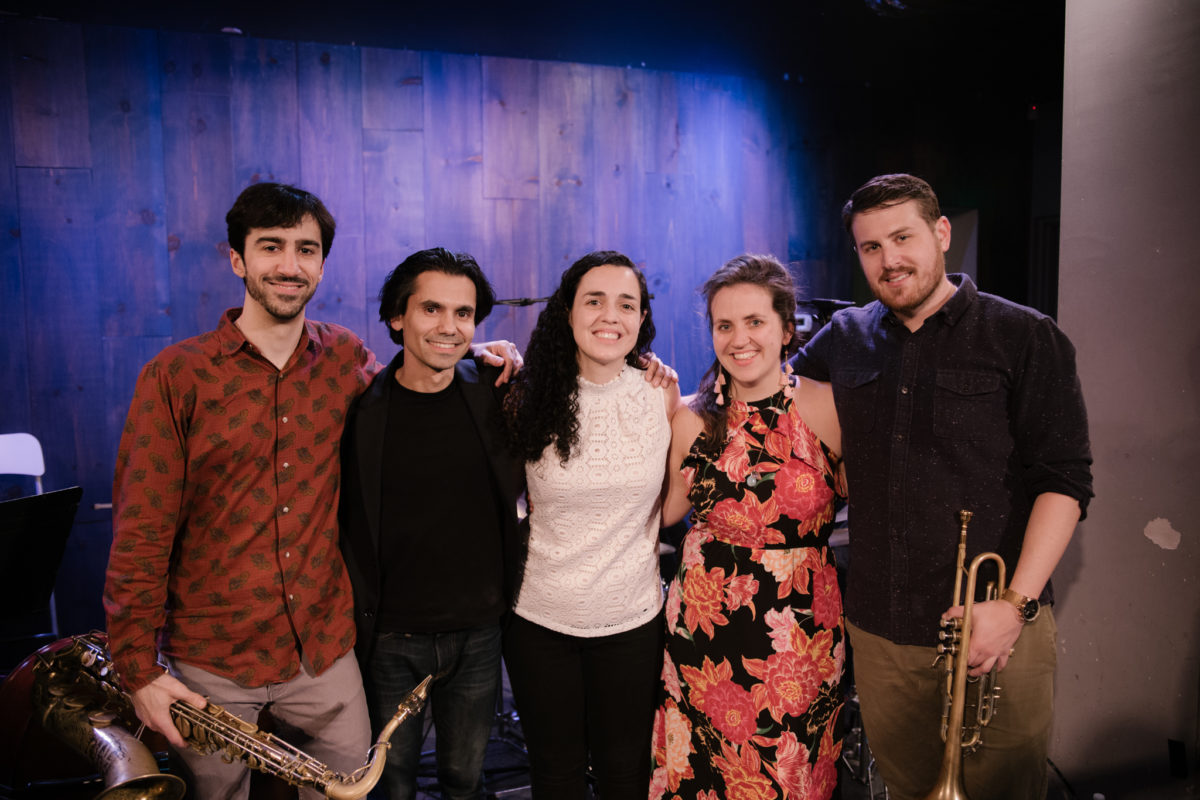
What is your ultimate career goal?
I want to teach at a good university. I want to play with great musicians in genres like jazz, singer/songwriter and Brazilian music. I also want to have the flexibility and stability to play in both the U.S. and Brazil. If I can get my career going there and here, then that would be amazing.
How do you separate your career from your identity?
I have struggled with that a lot. I think I still do. I have phases where I really know who I am. Then, I have phases where I don’t, where I’m really confused and all I see is what I’m not. Being here in L.A., you are surrounded by people who you think are better than you, and it messes with your self-worth and your identity. Even in school, I was already feeling like I couldn’t separate my identity from my career aspirations.
It has to do with maturity. Honestly, just getting older, I realized that I am not how I play the drums. I am not what everybody else wants me to be. As a drummer you kind of fit a mold sometimes and that’s not who I am. Also for me, my self-worth was connected to playing well. On days when I would play not as well as I knew I could, I not only thought I did a bad job, but I thought I sucked as a person because I messed up. To separate that was to just understand that the world didn’t end, nobody died because I messed up a little bit.
I realized that I am not how I play the drums. I am not what everybody else wants me to be.
One thing that really helped me separate my identity from what I do was to make a decision that if I don’t get this gig, that I’m still OK and something better will come along. My life is not this gig. Before, when an opportunity passed by me, I would be miserable for weeks. It’s just not worth it. I learned to be committed to myself rather than the gig. The gig happens, and it’s over. There’s so much more to life than that gig.
Knowing what you know now, what advice would you give to your younger self?
I’d tell her to believe in herself. I know that is very cliche, but I honestly really did not believe in myself. A lot of people believed in me, but I really didn’t.
A lot of my not believing in myself had to do with not fitting the stereotype of what femininity looks like. I thought I didn’t fit the mold because I do all these things that are not considered “very feminine.” I play the drums. I dress in a way that many people would say isn’t girly. There’s all these things about me that don’t seem to fit the mold. I thought I couldn’t fit this mold of a woman, and so I didn’t believe in myself in other areas as well.
There’s all these things about me that don’t seem to fit the mold.
I would tell my younger self to believe in the skills you have and go for it. Be cautious, but not afraid. Don’t regret things. I would be the one in a jam session who wouldn’t play because I was too scared. Then, all these people would play, and at the end of the session, I realized I probably could have done it and would have done a good job.
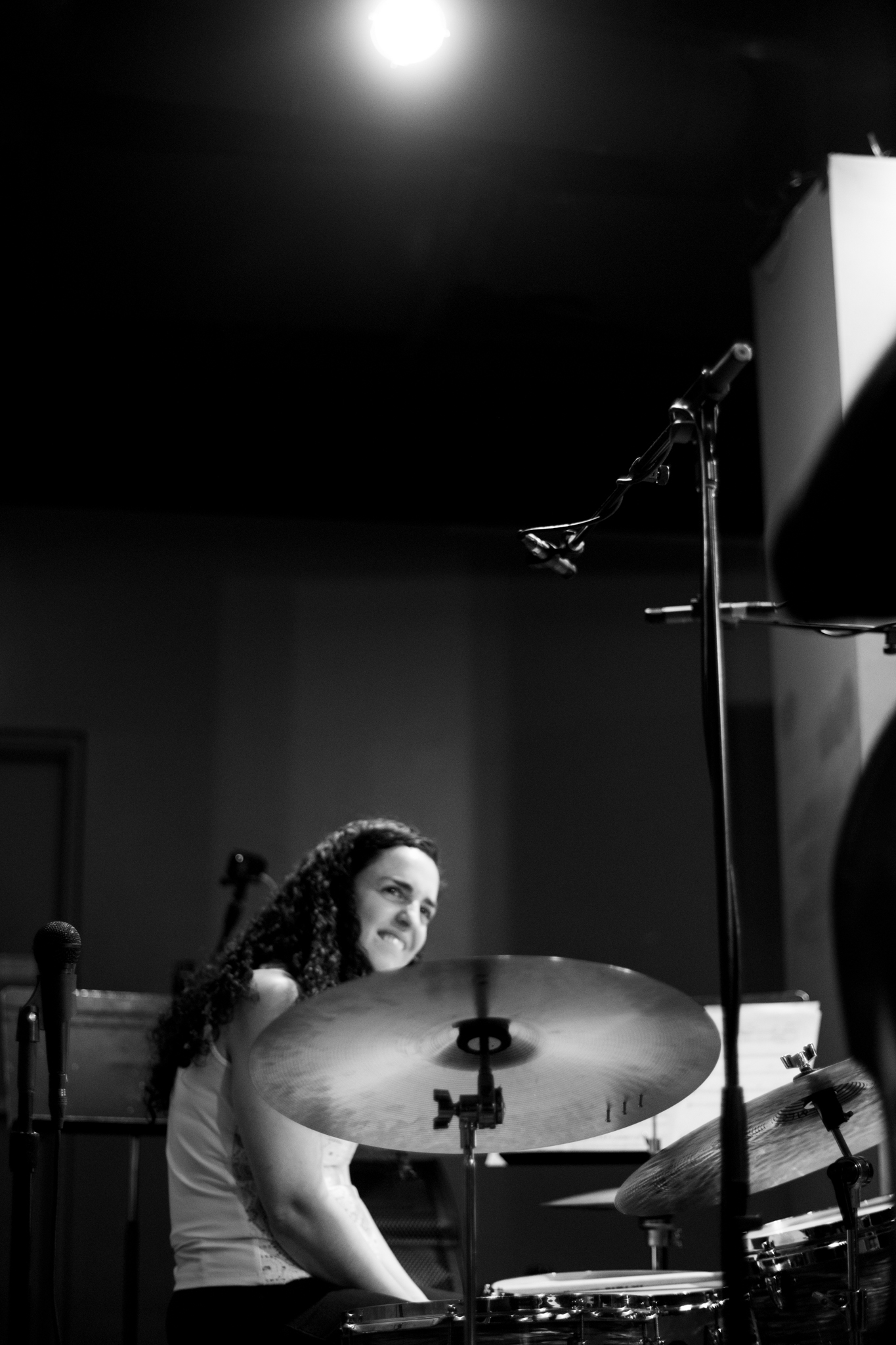
If there are young women interested in pursuing a career in music, what advice would you give them?
- Practice.
You cannot get anywhere if you don’t practice. It’s not going to be a pill. You’re not going to drink a pill, and learn how to play something. You have to put a lot of hard work into it. - Listen to a ton of music.
Know what you’re doing. There is a whole history behind it. There is a famous quote that I like to tell my students. “Talking about music is the same as dancing about architecture.” Meaning it’s not enough to talk about it. You have to listen. If you are an architect, then you have to go see buildings. You can’t just watch a dance about it. - Get a mentor.
Find someone who inspires you. Musicians love to mentor. Artists love to mentor other people. Maybe it’s not your hero. So it might not be Madonna mentoring you, but there might be someone in your community who wants to help you. You can explain that you admire them and really aspire to do music too. They will probably be willing to share their experiences. Maybe there’s a gig or a recording session where they can take you. That will get you inspired and get you believing in yourself a little more if you have a mentor. Get someone to walk with you. Doing this alone is really hard, especially if you are a young girl.
You can follow Ana’s music journey on Facebook, Instagram and on her website.
Images via Evan Zee Pictures
